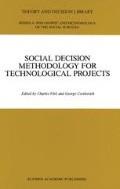Abstract
Many public policy problems at all levels — national, regional, state, and local — involve issues that can not easily be reduced to simple either-or propositions. That is, the problem involves diverse constituencies and interest groups who can not be grouped into two sides so that trade-offs can be made and a resolution reached through the typical political process (in the United States). For example, at the local level such an issue would involve extending the runways of the local airport, building a shopping center in a suburban area, or combining the fire and police departments into one organization. In such situations, the usual political alignments do not apply, as Republican and Democratic council-persons will align themselves on both sides of the issue because typical party loyalties among the citizens do not yield predictable stands on the issue.
This article is a product of the University of Michigan Value Oriented Social Decision Analysis Project (NSF Grant No. SS77-16294). We are indebted to Kenan P. Jarboe, Janet Wolfe, and Sydney Solberg for their contributions.
Access this chapter
Tax calculation will be finalised at checkout
Purchases are for personal use only
Preview
Unable to display preview. Download preview PDF.
References
Adelman, L. (1982). Real-time computer support for decision analysis in a group setting: another class of decision support systems. McLean, VA: Decisions and Designs, Inc.
Arrow, K.J. (1951). Social choice and individual Values. New York: Wiley.
Axelrod, R., (Ed.). (1976). Structure of decision. Princeton: Princeton University Press.
Bauer, V. and Wegener, M. (1977). A community information feedback system with multiattribute utilities. In: D.E. Bell, R.L. Keeney and H. Raiffa (Eds.), Conflicting objectives in decisions. New York: Wiley.
Bezembinder, Th. (this volume). Social choice theory and practice.
Brehmer, B. (this volume). Cognitive dimensions of conflict over new technology.
Chen, K. and Lagler, K.F. (et al.). (1974). Growth policy: population, environment, and beyond. Ann Arbor: University of Michigan Press.
Chen, K. and Mathes, J.C. (1986). Clarifying complex public policy issues: a social decision analysis contribution. In: M.J. Dluhy and K. Chen (Eds.), Interdisciplinary planning: a perspective for the future (pp. 83–104). New Jersey: Rutgers University.
Chen, K., Mathes, J.C., Jarboe, K. and Wolfe, J. (1979). Value oriented social decision analysis: enhancing mutual understanding to resolve public policy issues. IEEE Transactions on Systems, Man and Cybernetics, 9, 567–580.
De Hoog, R., Breuker, E. and Van Dijk, T. (this volurhe). Computer assisted group decision making. DelSesto, S.L. (1980). Conflicting ideologies of nuclear power. Public Policy, 28, 39–70.
Ebbin, S. and Kasper, R. (1974). Citizen groups and the nuclear power controversy: uses of scientific and technological information. Cambridge (Mass.): MIT Press.
Edwards, W. (1979). Multiattribute utility measurement in a highly political context: evaluating desegregation plans in Los Angeles. Paper presented at the Annual Meeting of the AmericanAssociation for the Advancement of Science.
Fisher, R. and Ury, W. (1981). Getting to yes: negotiating agreement without giving in. Boston: Houghton Miffin.
Greenstone, J.D. (1975). Group theories. In: F.I. Greenstein and N.W. Polsby (Eds.), Micropolitical theory (pp. 243–317). Reading, Mass: Addison-Wesley.
Hammond, K.R. and Adelman, L. (1976). Science, values, and human judgment. Science, 194, 389–396.
Holling, C.S. (Ed.). (1978). Adaptive environmental assessment and management. Chichester and New York: Wiley.
Howard R.A. (1975). Social decision analysis. Proceedings of the IEEE, Special Issue on Social Systems Engineering 63, (pp. 359–371).
Huber, G.P. (1980). Managerial Decision Making. Glenview, 111: Scott, Foresman and Co.
Irland, L.C. (1975). Citizen participation — a tool for conflict management on the public lands. Public Administration Review, 35, 263–264.
Johnson, R.L. (1980). A multiple objective decision process for environmentally related energy development decisions. Proceedings of the International Congress on Applied Systems Research and Cybernetics. Acapulco, Mexico.
Keeney, R.L. and Raiffa, H. (1976). Decisions with multiple objectives. New York: Wiley.
Lindblom, C.E. (1968). The policy-making process. New York: Prentice-Hall.
Mathes, J.C. and Stevenson, D.W. (1976). Designing technical reports: writing for audiences in organizations. Indianapolis: Bobbs-Merrill.
Nelkin, D. and Pollak, M. (1980). Ideology as strategy: the discourse of the anti-nuclear movement in France and Germany. Science, Technology, and Human Values, 9, 3–13.
Phillips, L.D. (1984). A theory of requisite decision models. Acta Psychologica, 56, 29–48.
Phillips, L.D. (this volume). Requisite decision modelling for technological projects, Quinn, R.E., Rohrbaugh, J. and McGrath, M. (1985). Automated decision conferencing: how it works. Personnel, Nov., 49–55.
Raiffa, H. (1968). Decision analysis; introductory lectures on choices under uncertainty. Reading, Mass: Addison-Wesley.
Raiffa, H. (1982). The art and science of negotiation. Boston: Harvard University Press.
Rapoport, A. (1970). N-Person game theory. Ann Arbor: University of Michigan Press.
Salisbury, R.H. (1975). Interest groups. In: F.I. Greenstein and N.W. Polsby (Eds.), Nongovernmental politics (pp. 171–228). Reading, Mass: Addison-Wesley.
Simon, H.A. (1976, 3rd ed.). Administrative behavior. A study of decision-making processes in administrative organizations. New York: The Free Press-Macmillan.
Vlek, C.A.J. (1986). Rise, decline and aftermath of the Dutch ‘Societal discussion on (nuclear) energy policy’ (1981–1983). In: H.A. Becker and A. Porter (Eds.), Impact assessment today (pp. 141–188). Utrecht: Van Arkel.
Waller, R.J. (1976, March). Comparing structural models of complex systems. Paper presented at the National American Institute for Decision Sciences Conference, Minneapolis, Minnesota.
Young, R.E., Becker, A.L. and Pike, K.L. (1970). Rhetoric: discovery and change. New York: Harcourt, Brace and World.
Author information
Authors and Affiliations
Editor information
Editors and Affiliations
Rights and permissions
Copyright information
© 1989 Kluwer Academic Publishers
About this chapter
Cite this chapter
Chen, K., Mathes, J.C. (1989). Value Oriented Social Decision Analysis: A Communication Tool for Public Decision Making on Technological Projects. In: Vlek, C., Cvetkovich, G. (eds) Social Decision Methodology for Technological Projects. Theory and Decision Library, vol 9. Springer, Dordrecht. https://doi.org/10.1007/978-94-009-2425-3_7
Download citation
DOI: https://doi.org/10.1007/978-94-009-2425-3_7
Publisher Name: Springer, Dordrecht
Print ISBN: 978-94-010-7593-0
Online ISBN: 978-94-009-2425-3
eBook Packages: Springer Book Archive

